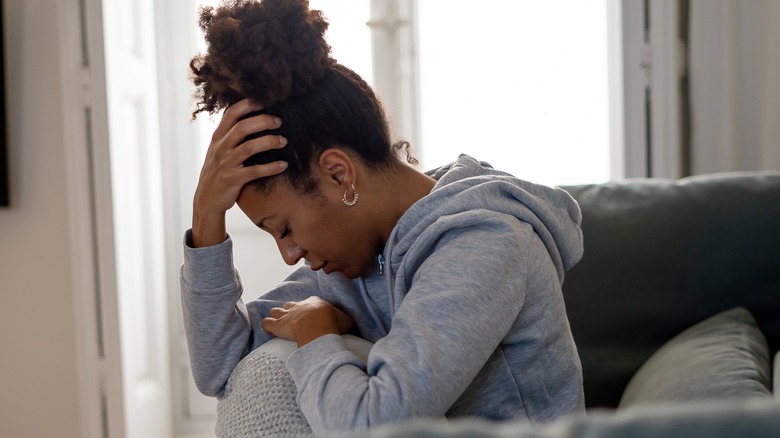Trichotillomania, a hair-pulling disorder, has both physical and mental symptoms (via the Mayo Clinic). It usually develops during early adolescence, characterized by repetitive, irresistible urges to pull out hair from the scalp, eyebrows, or other areas. Symptoms can also include a sense of tension when trying to resist pulling hair, a sense of relief after it’s pulled, thinning or sparse hair, chewing or eating pulled-out hair, and consistently trying to stop hair pulling with no success. While this can range from mild and manageable to completely overwhelming, it usually results in bald spots that can be a source of distress, especially when it comes to socializing or working. Furthermore, it can have a devastating effect on mental health.
Trichotillomania, commonly referred to as “trich” for short, affects up to 10 million people in the U.S., or about 3.5% of the population, according to the American Psychological Association. However, there are many people who experience a milder version of the disorder, according to Dr. Suzanne Mouton-Odum, who runs a practice specializing in trichotillomania. It’s considered an impulse control disorder, but people who have it also show signs of obsessive-compulsive behavior.
Treatment includes different kinds of therapy, like habit reversal therapy and cognitive therapy, Medications, such as antidepressants, are also sometimes prescribed. However, there aren’t any drugs specifically approved by the Food and Drug Administration (FDA) for trichotillomania (via the Mayo Clinic).
The role of negative emotions

There are negative emotions associated with trichotillomania, although it’s hard to say if they cause the disorder or are a symptom of it (via TrichStop). The physical symptoms can be hard to deal with, but the mental symptoms can be even more devastating. Those with trichotillomania often worry about what people will think and say about their hair loss, experiencing high levels of anxiety and stress. This can lead to withdrawal and social isolation, which can exacerbate the issues. This isolation can sometimes cause depression, as those with the disorder may feel helpless and powerless in trying to stop hair pulling.
Often, a person with trichotillomania may feel a wave of emotions after plucking out hair, such as guilt, shame, and embarrassment. This can impact their self-esteem and cause them to feel judged by others, further contributing to their withdrawal.
However, some studies show that these negative emotions of depression, stress, and anxiety may cause hair pulling in the first place — it is thought to be practiced as a coping mechanism. However, the wave of emotions that often come after the hair pulling fuels the cycle, leading experts to question which came first in this “chicken or egg” effect.